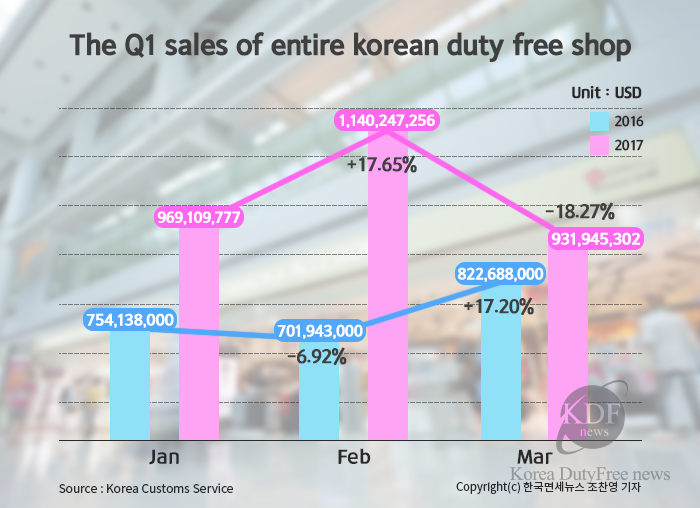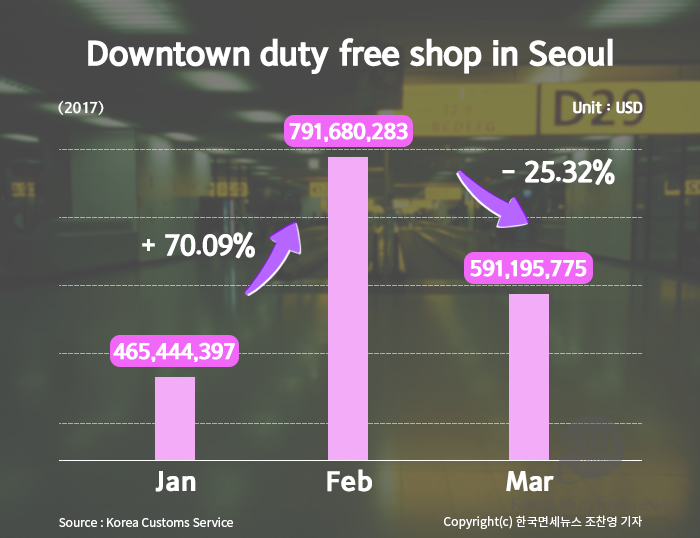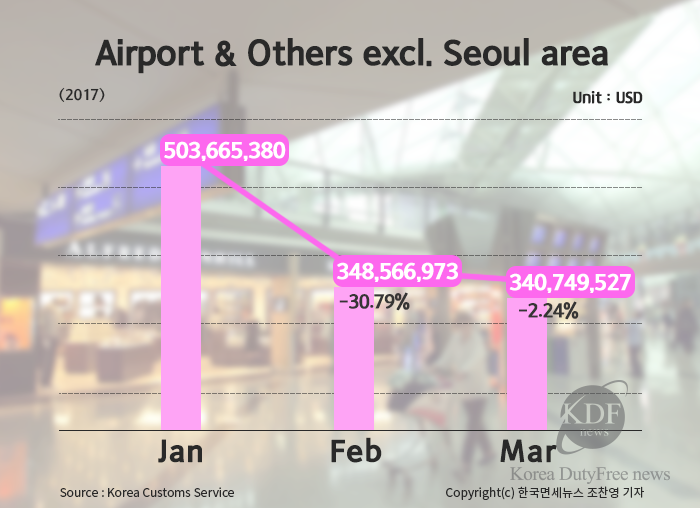SOUTH KOREA. Downtown duty free shops in Seoul and Jeju suffered sharp sales declines of -25.32% and -40.01% respectively in March compared to the previous month, due to the THAAD anti-missile system dispute between South Korea and China.
Total sales of all duty free shops in Korea decreased -18.27% from February to March, to US$932 million, according to Korea Customs Service figures first unveiled by our close colleagues at KDF News*. Those numbers are a stark contrast to the +17.20% month-on-month increase in the same period last year.
The sales decline comes as no surprise in the wake of the escalating THAAD dispute. Retailers have been hit hard by a China National Travel Administration ban on group travel to South Korea from 15 March.
The ban is part of a furious political and consumer backlash by China against the South Korean government’s decision to deploy the controversial US anti-missile system as a defence and deterrent against North Korean attacks. China considers THAAD a threat to its own security and to regional stability.

Lotte Duty Free has felt the brunt of the backlash due to parent Lotte Group’s agreement to site THAAD on company land. At the retailer’s COEX store, sales fell -58.7% from US$30,698,105 in February to US$12,691,141 in March, the largest decrease in any downtown store. Sales at Lotte’s main store fell -29.90%, dropped -29.21% at Lotte World Tower, slid -51.23% at its Jeju store, and declined -5.05% at its Busan store.
Sales at The Shilla Duty Free’s Seoul store were down -11.59% between February and March, to US$152,351,485. Shinsegae’s Myeong-dong duty free shop saw sales decline -11.23% to US$82,940,382.
Duty free shops in the departures area of Incheon International Airport experienced the drop in March sales somewhat later than the downtown duty free stores. “Those Chinese tourists who visited Korea before 15 March when the ban on visits to Korea went into effect shopped at these stores as they left the country, but as the total number of Chinese tourists visiting Korea decreased, the sales of the airport duty free shops were also affected,” KDF News said.


New duty free shops and small- and medium-sized (SME) duty free shops also felt the impact of the THAAD fallout. Shilla iPark duty free saw sales decrease by -10.43% in March compared to the previous month, while sales fell -7.67% and -11.76% at Galleria 63 and Doota Duty Free’s stores respectively.
Dongwha Duty Free witnessed a -12.58% decline in sales while at SM Duty Free Shop it was -12.19%. However, sales at the SM Duty Free Shop at Incheon International Airport increased +1.56%.
KDF News said that the number of Chinese tourists in Jeju “noticeably declined”, and the tax refund shops on Baozhen Street (a popular shopping street on Jeju) are “on the verge of shutdown”. Lotte, Shilla and the Jeju Tourism Organization saw sales at their downtown duty free shops in Jeju drop -51.23%, -29.67% and -35.15% respectively in March from February. Galleria’s duty free shop in the departures area of Jeju International Airport saw sales decrease -40.7% in March and -54.92% year-on-year. KDF News said the store was “facing a crisis”.

Click on image to enlarge
The local news outlet reported an informed duty free source as saying: “The number of Chinese tourists dwindled [in March], and to overcome the crisis we are doing everything we can to attract Japanese and Southeast Asian tourists. We are also conducting marketing programmes for locals to boost spending. As the domestic duty free market is facing a crisis due to the economic retaliation of China, we are expecting the government to come up with effective countermeasures.”
*NOTE: The Moodie Davitt Report and KDF News enjoy an exclusive information-sharing partnership.












